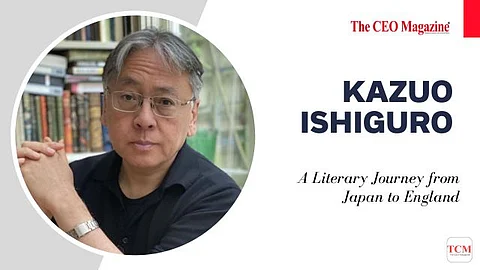
- News
- Women
- Magazine
- IndustryIndustry
- InsightsInsights
- Success Stories
- PublishPublish
- ContactContact
- Media KitMedia Kit

Kazuo Ishiguro
A Literary Journey from Japan to England
Sir Kazuo Ishiguro, a name synonymous with literary brilliance and versatility, is a Japanese-born British novelist, screenwriter, musician, and short-story writer. His remarkable career has earned him numerous accolades, including the prestigious Nobel Prize in Literature in 2017.
Ishiguro's works explore profound themes, and his writing is characterised by its emotional depth and unique narrative style. This article delves into the life, works, and contributions of this literary luminary.
Kazuo Ishiguro was born on November 8, 1954, in Nagasaki, Japan, to Shizuo Ishiguro, a physical oceanographer, and his wife, Shizuko.
His family's move to Guildford, Surrey, in 1960 had a significant impact on his upbringing and, ultimately, his writing. Ishiguro's unique perspective, growing up in a Japanese family in the UK, enabled him to see the world through a different lens, distinct from his English peers.
In an interview, he shared that he had an "imaginary Japan" in his mind while growing up, as his parents strived to maintain a connection with Japanese culture in their household.
This dual cultural experience profoundly influenced his writing, allowing him to examine issues of identity, belonging, and cultural collision in a nuanced way.
Kazuo Ishiguro's literary journey began with his time as a student. He studied at the University of Kent at Canterbury, where he graduated with a Bachelor of Arts in English and philosophy in 1978.
Later, he pursued a Master of Arts degree in Creative Writing at the University of East Anglia, where he studied under the guidance of acclaimed authors Malcolm Bradbury and Angela Carter.
His debut novel, "A Pale View of Hills," was published in 1982, followed by "An Artist of the Floating World" in 1986. These early works were set in Japan and explored themes of Japanese identity and post-World War II reconciliation. Ishiguro's ability to craft a mournful tone earned him recognition and established him as a notable author.
Ishiguro then ventured into different genres, from science fiction to historical fiction, showcasing his adaptability as a writer. His novel "The Remains of the Day," published in 1989, is considered one of his masterpieces.
It won the prestigious Booker Prize and was later adapted into a film in 1993. Salman Rushdie lauded the novel as Ishiguro's turning point, as it demonstrated his capacity for storytelling beyond Japanese settings.
In 2005, Ishiguro's science fiction novel "Never Let Me Go" gained widespread acclaim, earning its place as one of the best English-language novels published between 1923 and 2005, according to Time magazine.
In 2017, the Swedish Academy awarded Kazuo Ishiguro the Nobel Prize in Literature, honouring him for his ability to uncover profound emotional forces in his novels.
The Academy's citation recognised Ishiguro as a writer who revealed "the abyss beneath our illusory sense of connection with the world." This recognition solidified his place among the greatest authors in the history of literature.
Ishiguro has been married to Lorna MacDougall, a social worker, since 1986. They have a daughter, Naomi Ishiguro, who is also a writer. Ishiguro describes himself as a cinephile and an admirer of Bob Dylan.
Apart from his literary accomplishments, Ishiguro has ventured into the world of music. He has co-written lyrics for jazz singer Stacey Kent's albums, showcasing his talent as a lyricist. He noted that his experience in lyric writing has had a significant influence on his fiction writing.
Sir Kazuo Ishiguro's literary journey from Japan to England and his exploration of diverse themes have left an indelible mark on contemporary literature. His ability to transcend cultural boundaries and tell stories with great emotional force has earned him worldwide recognition.
As a Nobel laureate, he stands as a beacon of literary excellence, inspiring readers and writers alike. Ishiguro's work continues to be celebrated, and his impact on literature endures as a testament to the power of storytelling and the complexity of the human experience.
Follow us on Google News
